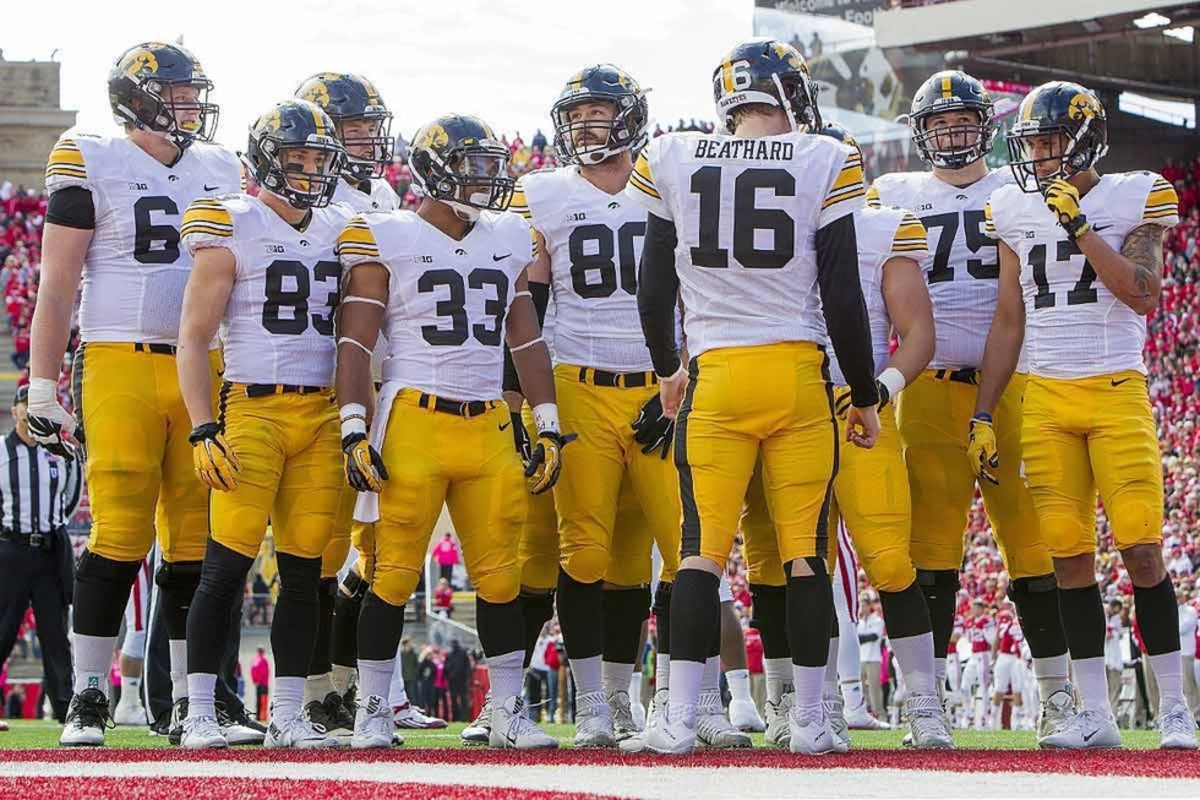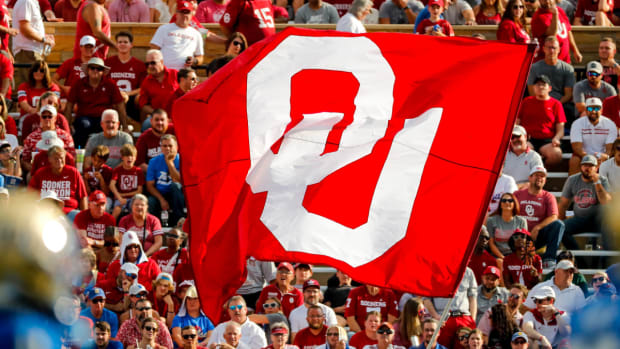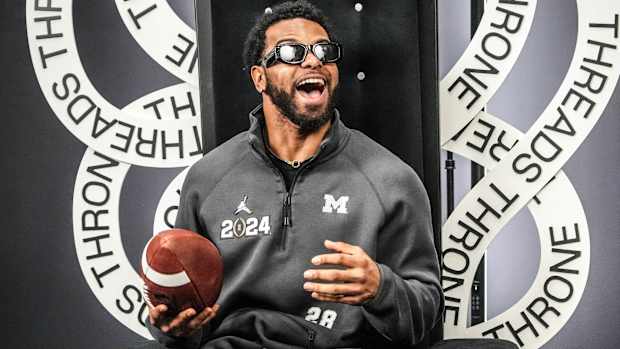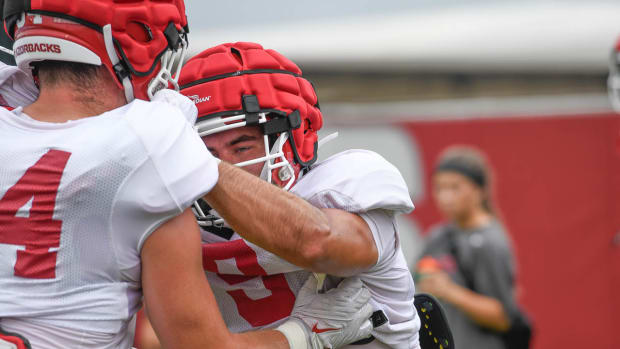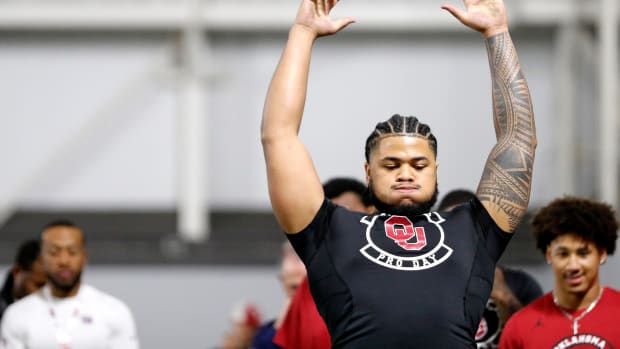Blue collar approach has Iowa off to fast start; Arizona State finds defensive identity
When Iowa coach Kirk Ferentz and his coaching staff met in early January, they hardly recognized their program that had been built on a blue-collar mentality of toughness and physicality. The group was unhappy with last season's lackluster 7-6 campaign, one in which Ferentz came under even more criticism as his team lost five of its last seven games. They were humiliated by the 45-28 defeat to Tennessee in the TaxSlayer Bowl, a result much worse than the final score indicated.
Yet what disappointed Ferentz and Co. the most was the way the Hawkeyes performed last season. So during that soul-searching meeting in January, Ferentz and his staff discussed their program's identity crisis, how it occurred and how they were going to fix it. The answer was simple: Get back to playing Iowa football. And to better familiarize current players with how that's done, the televisions at the team's facility played endless loops of games from the Hawkeyes' past glory days.
"We weren't playing Iowa football," offensive line coach Brian Ferentz tells The Inside Read. "We weren't tough and physical. We weren't any of those things. We lost close games. We were sh---- on special teams, got the ball run up our a-- and we didn't run the ball. We just weren't us. There was a lot of disappointment and frustration. I'd go so far as to say embarrassment because that's not who we are."
Iowa's back-to-basics approach is working thus far as the Hawkeyes are 5-0 and ranked No. 22, their best start since 2009 when they finished 11-2 and won the Orange Bowl. The renewed identity was on full display in Saturday's gritty 10-6 win at No. 19 Wisconsin.
"Who we've been around here is a tough, physical football team that does things the right way," Ferentz says, "That plays good on defense. That runs the football effectively on offense and stops the run on defense."
Iowa has followed that recipe this season with a stingy defense that is 15th in the nation in points allowed (15.4 points per game), 11th in rushing yards allowed (84.4 yards per game) and 16th in sacks (3.2 per game). All three are significant improvements from being around the middle of the pack nationally in each category last season.
"I give a lot of credit to our kids," Ferentz says. "They've worked their a-- off. It's really easy to be happy for them."
Offensively, Iowa is also running the ball more effectively this season, averaging a half-yard more per carry (4.62) than last season. It's why the Hawkeyes won Saturday despite having just 221 yards of offense, 144 on the ground.
Redshirt senior tailback Jordan Canzeri had a season-high 125 rushing yards on 26 carries to offset the worst performance of starting quarterback C.J. Beathard's career. The redshirt junior completed just 9 of 21 passing for 77 yards with a touchdown and interception.
But despite the offense playing what Ferentz calls about as "s-----" as possible, he was proud of Saturday's close win, a hallmark of past Hawkeyes teams. "If we can just put things together, we could get even better," Ferentz says.
Beathard was named Iowa's starter in January, a decision that led to former starter Jake Rudock transferring to Michigan, where he has the Wolverines off to 4-1 start this season. But the Iowa coaching staff felt Beathard gave them the best chance of winning games, according to Ferentz.
Beathard has completed 64.1% of his passes for 1,039 yards with seven touchdowns and two interceptions this season. "We made the decision that was best for us," Ferentz says. "We still feel that way. We never looked back on it for a second. We feel like it was the right move."
Just like Ferentz and Co. thought it was best to return to their roots this season. The younger Ferentz pointed out that there were no changes made to the Hawkeyes' coaching staff. "If your wife or your brother dies, you don't just go get a new one," Ferentz says. "That's not how life works when you run into a little trouble. You just don't move on to the next one."
Many on Iowa's staff are former Hawkeyes players or have previously coached at the school. "For a lot of guys in this building, it's their life's work," Ferentz says of Iowa. "Everybody made a commitment to get better at their job. We all had ownership in what we had done. We felt like the only way to change was that we all took ownership in it going forward."
That meant refocusing on Iowa's core values instead of dwelling on a past that couldn't be changed, according to Ferentz. "We try to do it our way and not really get too worried about what everyone else is doing," he says. "I think where we got in trouble in the past is what's right for us isn't right for everybody else. And what's right for everybody else is not always right for us."
After Saturday's win, an Iowa player proclaimed the Hawkeyes are back and even went as far to say that so is their reputation as "The Bullies of The Big Ten," according to Ferentz. That's a mantra that was bestowed on the program after it upset Michigan in 2003.
But it's not one that Ferentz is ready to re-embrace yet, even with his team in the thick of Big Ten West race and its favorable remaining schedule that includes just one ranked opponent (No. 13 Northwestern). "To me, we're not back," Ferentz says. "We're trying to get back, but until somebody else says The Bullies of the Big Ten are back, you're not. You don't give yourself a nickname."
Iowa's coaching staff has challenged its players to earn their place alongside Hawkeyes legends such as Marv Cook, Bob Sanders and Robert Gallery. They appear all too often in the old games replayed in Iowa's facility.
"They all kind of look the same," Ferentz says of Iowa's past teams. "The names change, the helmets look a little bit more modern and there's a difference with the HD, but all those teams look the same. They play tough, physical defense. They run the ball. They're great on special teams and they win close games."
That too describes Iowa's win Saturday. Looks like the Hawkeyes have another game to show.
Ric Tapia/Icon SMI
Arizona State's turnaround tied to defense
Arizona State defensive coordinator Keith Patterson knew his unit hadn't played well this season. After all, the Sun Devils had been scorched defensively in a 38-17 season-opening loss to Texas A&M and during an embarrassing 42-14 home loss to USC late last month.
But what Patterson didn't expect was to hear about his defense's sluggish play from his family and the family of head coach Todd Graham (the men are close friends dating back to college). The family members shook their heads at what they had seen in Arizona State's first four games and told both men it wasn't the same aggressive, high-energy unit they were used to.
The criticism made Patterson joke with Graham that they better fix their team's defensive woes or their families weren't going to let them come home. "They were just being brutally honest," Patterson tells The Inside Read.
So after Patterson and the defensive-minded Graham re-evaluated every aspect of Arizona State's defense last week, they decided Patterson would start spending games on the sideline instead of in the press box.
The move was one of many changes that paid off immediately in the Sun Devils' 38-23 road upset at seventh-ranked UCLA last Saturday, a game in which Patterson's defense produced a season-high four turnovers. Arizona State (3-2, 1-1) held the Bruins to a season-low 342 yards offensively in the win, which improved Graham's career record to 7–1 following losses of 28 points or more.
"The kids have really just responded," Patterson says. "We really had to take a look at ourselves."
Patterson hadn't been on the field for a game since he alternated between the sideline and press box while working as West Virginia's defensive coordinator in 2013. He has a better vantage point from the press box but gets a better pulse on his players from the sideline.
"You let them see the confidence you have not only in them, but what we're doing," Patterson says. "I was trying to be upbeat and positive and bring energy we just haven't had in the first four games."
This season was supposed to the breakthrough campaign in which Graham and his Sun Devils perhaps finally won the Pac-12 championship. He had touted this team as the best it has ever been both offensively and defensively during his four seasons in Tempe.
Yet Arizona State had mostly looked flat, especially defensively, until Saturday's triumph. Patterson says his unit didn't "feel right" in the Texas A&M loss.
Even in Arizona State's 35-21 victory over Cal Poly last month, Patterson felt as if the FCS team was playing "a gear faster" than his unit. His defense was crushed by big plays in the blowout loss to USC, which he admits may have been the result of trying to do too much defensively that resulted in busted coverages and alignments.
The Sun Devils still rank 85th in scoring defense nationally under Patterson, who is in his second year as the program's defensive coordinator. "I can't explain it," Patterson says of Arizona State's first four games. "I was watching it from the press box saying, 'What in the world?'"
But Patterson took full responsibility. He stood up in front of his defense at the start of preparation for UCLA last week and told the unit he was analyzing every way he could improve.
Upon doing so, Patterson discovered his complicated defense had become more about scheme than effort. "It quit becoming about get in a stance, get your eyes on your key and run to the football," Patterson says. "Then once you do, get your eyes to the sideline for the next call. That's how simple it was."
Besides the move to the sideline, Patterson also decided to ditch a headset system that he used to communicate with Arizona State's other defensive coaches during practices. The Sun Devils used to only employ the system once a week before they started using it for every practice.
Without the headset, Patterson started running to the ball with his players in practice. That was another change that stemmed from the frank discussion Patterson and Graham had about their defense after the USC loss.
"Everything that we did to get here," Patterson told Graham during that conversation, "we don't do anymore."
But after Saturday's win, Graham and Patterson aren't getting the same criticism from their families anymore with Arizona State still in the mix for the Pac-12 South crown. On the way back to the team hotel afterward, Patterson received a text from his brother, Craig, the athletic director at Kingfisher (Okla.) High. He had been in attendance for Arizona State's nightmare loss to USC.
"I don't know what you did in practice this week," the text read, "but I'd do it again this week."
For a daily dose of college football insight, check out The Inside Read every weekday on Campus Rush.
